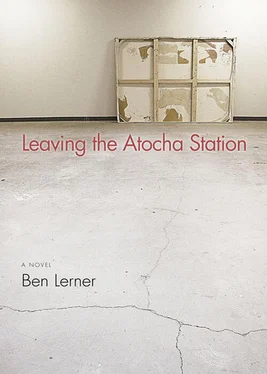When I finished reading about Teresa, I set out immediately for her apartment, a thirty- or forty-minute walk from Huertas. When I had returned from Barcelona, I had feared the worst, that Teresa was through with me, and for the first couple of days I could not find her at her apartment or the gallery. Finally she came by my apartment with new drafts of her translations; she betrayed no anger or irritation or newly established distance. Now that it was heating up, she was wearing a tank top and I could see her dark shoulders and the back I’d wept down. I apologized again for getting lost and told her how embarrassing the whole thing was. She said she had been worried and irritated but insisted, largely with her smile, that it was no big deal. When she asked me what poet I met up with, I gave her a name I had found on the internet and was relieved when she said she’d never heard of him. I said it was an awkward, boring conversation, and that I wished I’d returned with her. In fact I had awoken early and taken the first train back to Madrid. From that time on I saw Teresa almost every afternoon and often spent the night at her apartment; while we continued to kiss and fool around, we did not make love. This struck me as strange, but not worrisome; maybe I liked protecting the idea of our making love from clumsy attempts at its actualization. I told myself that we were taking it slow, that our connection to one another was so ardent, it had to be managed with extreme care; maybe Teresa was waiting to hear that I would stay in Spain before giving herself more fully to our relationship. That she made out with or maybe fucked Carlos and various other pretty boys, while filling me with jealous rage, only supported my theory of our exceptionality; if she didn’t find me attractive, she would have long since stopped seeing me; and if she did find me attractive, why would such a physically uninhibited person decline to sleep with me? Only, I reasoned, because she was shielding herself from the intensity of her own emotions. But now the panel somehow cast all this in doubt. As I cut through Chueca and passed near the site of our first meeting, I began to suspect she was merely toying with me, that for whatever reason, maybe because she thought I had seen Isabel in Barcelona, she was going to reveal to the foundation and her distinguished peers that I was, at best, a charlatan.
By the time I reached her building, I was hot and thirsty and indignant. Some kind of courier, cardboard tube tucked under his arm, was leaving the building when I arrived, so I didn’t ring the bell. The elevator did not require the key and when the doors opened, I did not see her. Then I heard the shower. I drank a glass of water, poured myself a real drink, and sat down on her couch. I was glad she would be shocked to see me, maybe scream; I was shocked to see her on the flyer. Fuck you, I said to the cat, who was blinking its knowing blink.
She wasn’t shocked. She emerged wrapped in a towel, saw me, approached and kissed me, then walked to her closet to select her clothes.
“We’re on the panel together,” I said flatly, watching the action of her shoulders as she searched through her wardrobe.
“Yes,” she said.
“Why didn’t you tell me?” I asked, attempting to betray no anger.
“I thought you knew. María José told me you were on the panel and I assumed you were the one who asked her to invite me.” I was reluctant to admit it was reasonable.
“I’m not going to do it,” I said.
“Why?” she asked, but didn’t seem particularly to care.
“Because I have nothing to say. Because I don’t speak good Spanish. Because literature isn’t politics.” My intensity was misplaced.
She pulled on jeans and a white tank top, which made her skin appear darker. She sat down beside me. “I have known you for six or seven months,” she said, almost sadly. “We only speak Spanish. When are you going to admit that you can live in this language?” she asked.
I was touched by this, mainly because I thought she was inviting me to live in Spanish with her, to stay beyond the fellowship. My anger dissipated. “I can live in this language with you, but not with María José and the foundation. Besides, I have nothing to say about ‘literature now,’” I said.
Again there was something like sadness: “Adam, you are a wonderful poet, a serious poet. If I weren’t sure about that, why would I be translating you? When are you going to stop pretending that you’re only pretending to be a poet?” She said only my name in English.
“You project what you pretend to discover in my poetry,” I said in English.
She took my cigarette from me and I lit another. “No,” she said simply, whether in English or Spanish I couldn’t tell.
We sat in silence and I wondered if Teresa was right; was I in fact a conversationally fluent Spanish speaker and a real poet, whatever that meant? It was true that when I spoke to her in Spanish I was not translating, I was not thinking my thoughts in English first, but I was nevertheless outside the language I was speaking, building simple sentences with the blocks I’d memorized, not communicating through a fluid medium. But why didn’t I just suck it up, attend the panel, and share my thoughts in my second language without irony? They wanted the input of a young American poet writing and reading abroad and wasn’t that what I was, not just what I was pretending to be? Maybe only my fraudulence was fraudulent. Regardless, Teresa’s presence would protect me, not humiliate me; that she had selected my work to translate would lend it prestige, underwrite it, so to speak, and she would intervene if I talked myself into a corner at any point. I would be nervous and maybe it would be awkward but it would not be disastrous; María José would be placated, and my relation to Teresa would be publicized, helping to establish us in our own minds as a couple. I could send a copy of the fancy flyer to my mother. I leaned over and kissed her; she smelled like smoke and, because of the soap, lavender.
“I’m not going back to the United States,” I heard myself say.
Her eyes widened and I thought her smile diminished. “Really?”
“I mean I’m not going back in June,” I said. “I will probably go back eventually,” I said. I was waiting for her to be excited.
“Good,” she said, but my stomach sank at her lack of emotion. Or was it my heart.
“I’ll write and teach English and travel,” I said to say something.
“Good,” she repeated, with more, but insufficient, emotion, as the smile returned fully to her face. “You can come with me to Córdoba in June and meet my family,” she said. I was reassured; she was thinking long term. She did not, however, seem to be thinking of the long term with excitement.
“I would like to,” I said, careful not to sound excited myself. “And I would like to spend more time in Barcelona,” I said, inviting her with my eyebrows to consider whether Isabel or another woman might be awaiting me there. “And to go back to Granada,” I added, to make sure Isabel was evoked. “I never saw the Alhambra.”
“You went to Granada but didn’t see the Alhambra,” she confirmed, squinting.
“Yes,” I said. I hoped she thought I was too busy making passionate love to Isabel to see the sights. “Arturo and Rafa said I could stay at Rafa’s,” I said, and stared at her hard, gauging her response.
“Yes, I know,” she said, implying they had discussed it, but not revealing which side of the discussion she was on.
“But I’ll probably just keep my apartment,” I said.
“Yes, stay in the city,” she said. Then, “Stay here, where I am.” Now she sounded excited. She kissed me with unusual intensity and boundless, if blurry, prospects opened up.
Читать дальше












